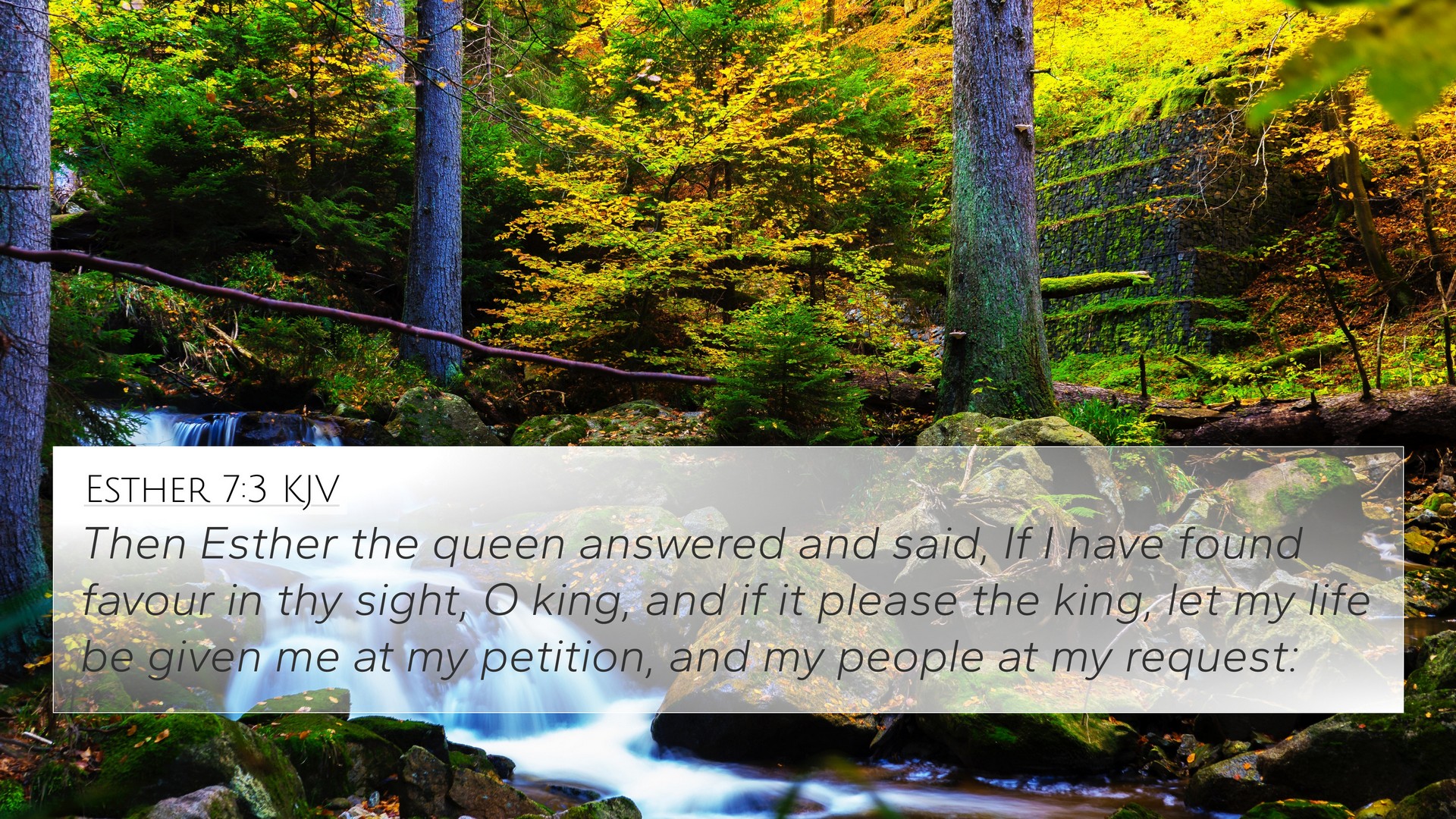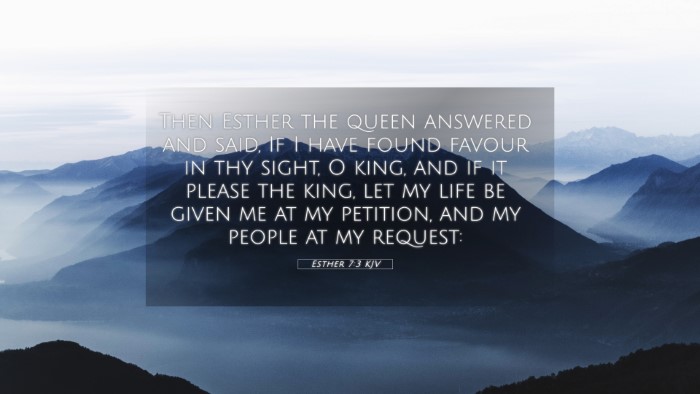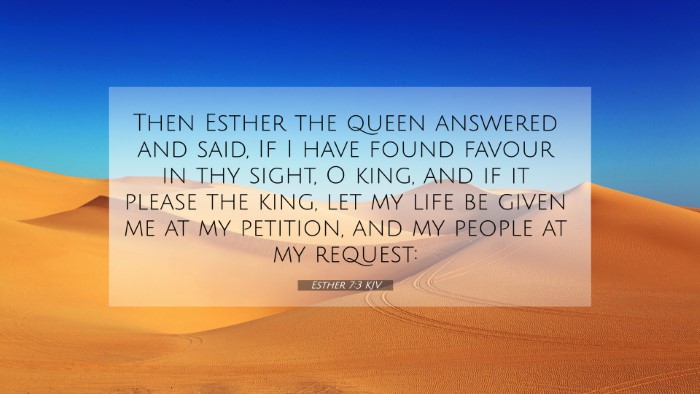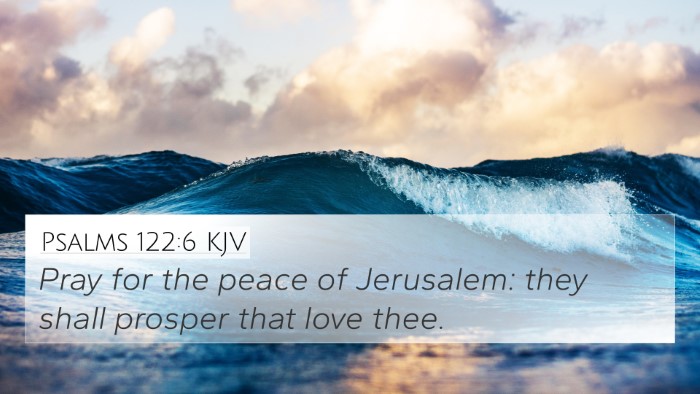Old Testament
Genesis Exodus Leviticus Numbers Deuteronomy Joshua Judges Ruth 1 Samuel 2 Samuel 1 Kings 2 Kings 1 Chronicles 2 Chronicles Ezra Nehemiah Esther Job Psalms Proverbs Ecclesiastes Song of Solomon Isaiah Jeremiah Lamentations Ezekiel Daniel Hosea Joel Amos Obadiah Jonah Micah Nahum Habakkuk Zephaniah Haggai Zechariah MalachiEsther 7:3 Similar Verses
Esther 7:3 Cross References
Then Esther the queen answered and said, If I have found favour in thy sight, O king, and if it please the king, let my life be given me at my petition, and my people at my request:
Uncover the Rich Themes and Topics of This Bible Verse
Listed below are the Bible themes associated with Esther 7:3. We invite you to explore each theme to gain deeper insights into the Scriptures.
Esther 7:3 Cross Reference Verses
This section features a detailed cross-reference designed to enrich your understanding of the Scriptures. Below, you will find carefully selected verses that echo the themes and teachings related to Esther 7:3 KJV. Click on any image to explore detailed analyses of related Bible verses and uncover deeper theological insights.
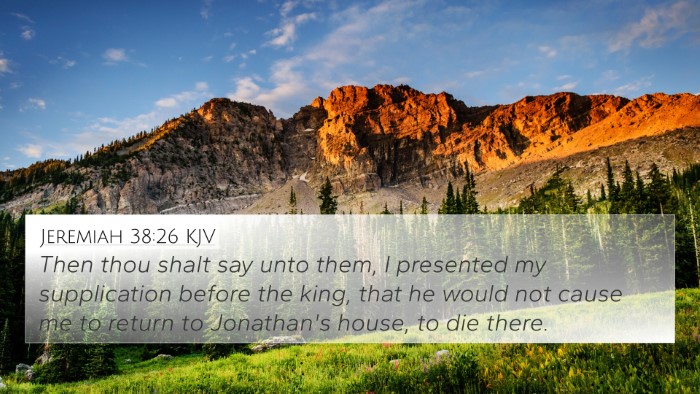
Jeremiah 38:26 (KJV) »
Then thou shalt say unto them, I presented my supplication before the king, that he would not cause me to return to Jonathan's house, to die there.

Job 2:4 (KJV) »
And Satan answered the LORD, and said, Skin for skin, yea, all that a man hath will he give for his life.
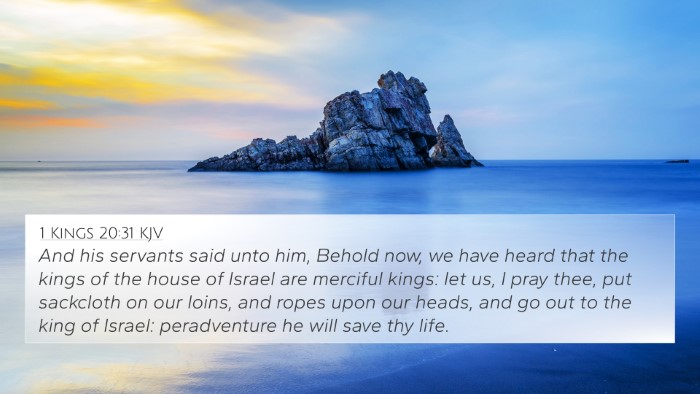
1 Kings 20:31 (KJV) »
And his servants said unto him, Behold now, we have heard that the kings of the house of Israel are merciful kings: let us, I pray thee, put sackcloth on our loins, and ropes upon our heads, and go out to the king of Israel: peradventure he will save thy life.
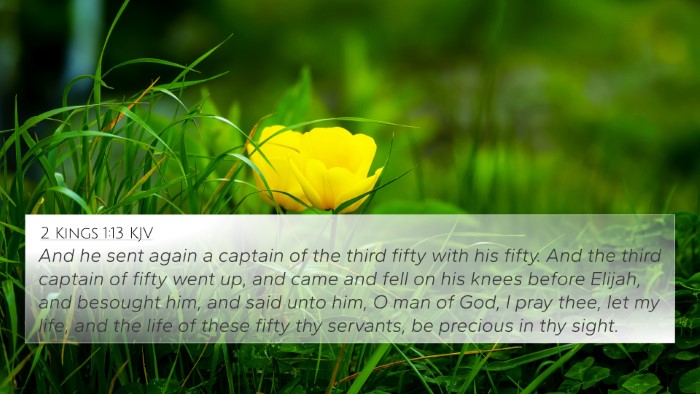
2 Kings 1:13 (KJV) »
And he sent again a captain of the third fifty with his fifty. And the third captain of fifty went up, and came and fell on his knees before Elijah, and besought him, and said unto him, O man of God, I pray thee, let my life, and the life of these fifty thy servants, be precious in thy sight.
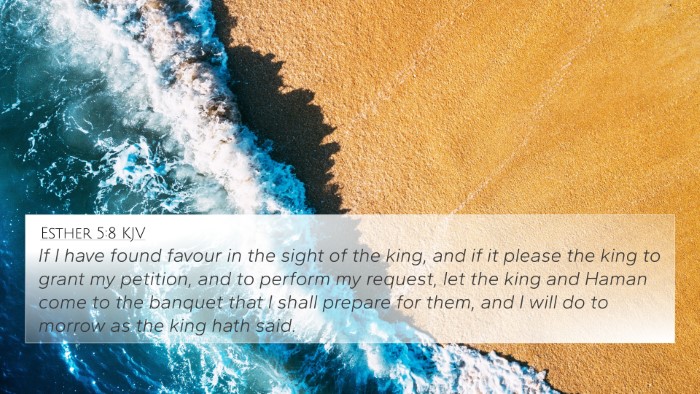
Esther 5:8 (KJV) »
If I have found favour in the sight of the king, and if it please the king to grant my petition, and to perform my request, let the king and Haman come to the banquet that I shall prepare for them, and I will do to morrow as the king hath said.
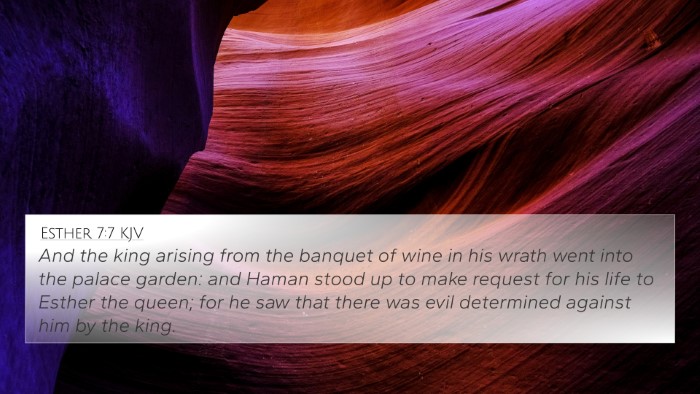
Esther 7:7 (KJV) »
And the king arising from the banquet of wine in his wrath went into the palace garden: and Haman stood up to make request for his life to Esther the queen; for he saw that there was evil determined against him by the king.
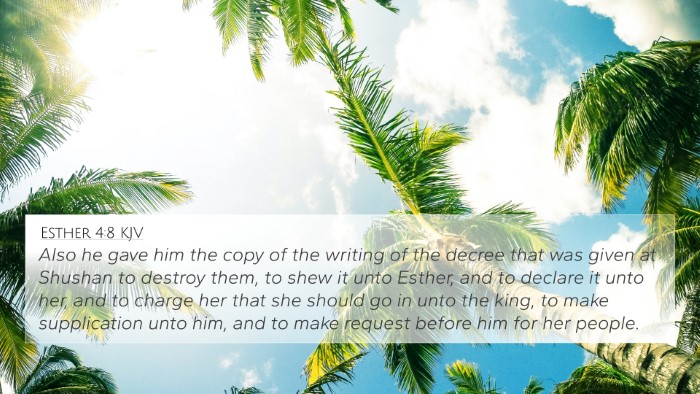
Esther 4:8 (KJV) »
Also he gave him the copy of the writing of the decree that was given at Shushan to destroy them, to shew it unto Esther, and to declare it unto her, and to charge her that she should go in unto the king, to make supplication unto him, and to make request before him for her people.
Esther 7:3 Verse Analysis and Similar Verses
Understanding Esther 7:3
Esther 7:3 captures a pivotal moment in the Book of Esther where Queen Esther reveals her identity and pleads for her life and the lives of her people to King Xerxes. This verse is essential not just for its narrative but also for its theological implications.
The verse states:
Esther 7:3 (NIV): "Then Queen Esther answered, 'If I have found favor with you, your majesty, and if it pleases you, grant me my life — this is my petition. And spare my people — this is my request.'
Key Themes and Insights
- Petitioning for Mercy: Esther’s appeal to the king underscores the human instinct for self-preservation and the protection of others. It reflects a deep emotional plea and bravery in the face of peril.
- Identity and Vulnerability: Esther reveals her Jewish identity to the king, marking a significant turning point in her relationship with him and showcasing her courage.
- Divine Providence: The context of this verse emphasizes God's sovereignty in the affairs of men, orchestrating events for the deliverance of His people.
Commentary Insights
Matthew Henry
Matthew Henry emphasizes that Esther's boldness to approach the king illustrates the profound risk she was willing to take for her people's survival. He notes that her request is both personal and collective, signifying the unity of her identity with her people.
Albert Barnes
Albert Barnes highlights the significance of Esther’s words, illustrating the importance of favor in the eyes of authority. He suggests that Esther’s situation represents the broader theme of intercession and advocacy before God and earthly rulers alike.
Adam Clarke
Adam Clarke delves into the psychological aspects of Esther’s plea, noting that she speaks with a sense of desperation yet composure, a reflection of her faith amidst danger. He points out that her wisdom in crafting her petition is a lesson in advocacy.
Bible Verse Cross-References
Esther 7:3 relates to various other biblical texts which offer a deeper understanding of its themes:
- Esther 4:14: Esther’s call to action and the realization of her role in her people's fate.
- Numbers 35:25: The theme of refuge and protection for innocent blood.
- Proverbs 21:1: The king's heart being in God's hand and His influence over rulers.
- Matthew 5:11-12: The blessedness of those who endure persecution for righteousness' sake.
- Romans 8:31: If God is for us, who can be against us?
- Luke 1:37: For nothing will be impossible with God, reflecting the miraculous nature of Esther's situation.
- Psalms 34:17: The Lord hears the cries of the righteous, connecting divine response to human pleas.
Thematic Connections
This verse also unearths connections between different biblical narratives:
- Courage in Adversity: Similar to David in 1 Samuel 17, both figures display extraordinary courage against overwhelming odds.
- Divine Intervention: Illustrating how God intervenes in critical moments, akin to the stories of Daniel in the lion's den (Daniel 6).
- Identity and Faithfulness: Esther's revelation parallels the testimony of Paul in Romans 1:16 about not being ashamed of the gospel.
Practical Applications
Studying Esther 7:3 through these various lenses encourages believers to:
- Embrace their identity in Christ and advocate for others.
- Trust in God's providential care during times of distress.
- Engage in intercessory prayer, recognizing the power of petitioning before God and earthly authorities.
Conclusion
Esther 7:3 is more than just a historical moment; it is rich with lessons about identity, faith, courage, and divine intervention. By examining such verses through cross-referencing and thematic analysis, believers can deepen their understanding and application of scripture in their lives.
